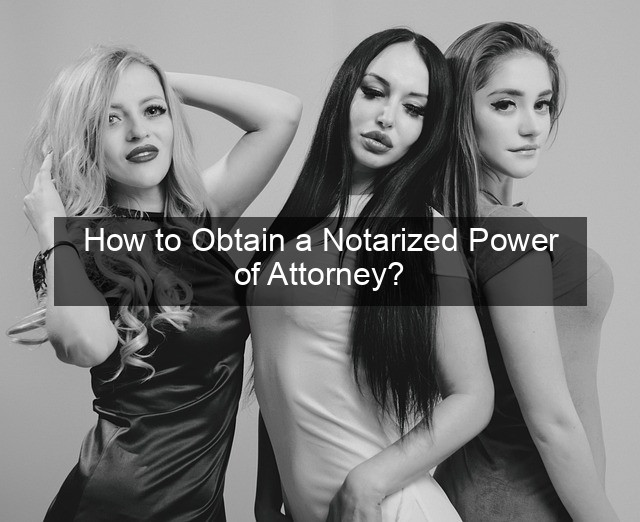How to Obtain a Notarized Power of Attorney?
- How to Obtain a Notarized Power of Attorney?
- Securing a Notarized Power of Attorney: A Comprehensive Guide
- Understanding the Different Types of Powers of Attorney
- Durable Power of Attorney
- Non-Durable Power of Attorney
- Special or Limited Power of Attorney
- The Process of Obtaining a Notarized Power of Attorney
- Drafting the Power of Attorney Document
- Finding a Notary Public
- Signing and Notarization
- State-Specific Requirements for Powers of Attorney
- Variations in Legal Requirements
- Witness Requirements
- Specific Wording and Formatting
- Key Considerations When Granting Power of Attorney
- Choosing the Right Agent
- Scope of Authority
- Review and Updates

Securing a Notarized Power of Attorney: A Comprehensive Guide
A Power of Attorney (POA) is a crucial legal document that grants another person, known as the agent or attorney-in-fact, the authority to act on your behalf. This authority can encompass a wide range of decisions, from financial transactions to healthcare choices. A notarized Power of Attorney adds an extra layer of validity and security, ensuring its acceptance by third parties. This comprehensive guide will delve into the intricacies of obtaining a notarized POA, empowering you to navigate the process with confidence and clarity.
Understanding the Different Types of Powers of Attorney
Durable Power of Attorney
A Durable POA remains effective even if you become incapacitated, ensuring your agent can continue to act on your behalf. This is particularly important for long-term planning and managing affairs in unforeseen circumstances. It provides peace of mind knowing that your wishes will be upheld even if you’re unable to communicate them yourself.
Durable POAs are commonly used for handling financial matters, such as paying bills, managing investments, and selling property. They can also be used for healthcare decisions, allowing your agent to make choices about your medical treatment if you become unable to do so.
It’s crucial to choose a trustworthy and capable individual as your agent for a Durable POA. This person should be someone who understands your wishes and will act in your best interests.
Non-Durable Power of Attorney
A Non-Durable POA is effective only for a specific period or until a specific event occurs. It terminates automatically if you become incapacitated. This type of POA is often used for limited purposes, such as authorizing someone to sign documents on your behalf while you’re unavailable.
A common scenario for using a Non-Durable POA is when you’re out of the country and need someone to manage your affairs temporarily. It’s a practical solution for specific situations where you need someone to act on your behalf for a limited time.
It’s important to clearly define the scope and duration of a Non-Durable POA to avoid any misunderstandings or misuse of authority.
Special or Limited Power of Attorney
A Special or Limited POA grants authority for a specific purpose, such as selling a particular piece of property or handling a specific legal matter. This type of POA is often used when you need someone to act on your behalf for a very specific and defined task.
For example, you might grant a Limited POA to a real estate agent to sell your house or to an attorney to represent you in a legal proceeding. This limits the agent’s authority to the specified task, providing greater control over your affairs.
When creating a Special POA, it’s crucial to clearly outline the specific powers being granted to avoid any confusion or overstepping of boundaries.
The Process of Obtaining a Notarized Power of Attorney
Drafting the Power of Attorney Document
The first step is to draft the POA document. You can use a template or consult with an attorney to ensure it meets your specific needs and complies with your state’s laws. Clearly define the powers you are granting to your agent and any limitations or restrictions.
The document should clearly identify you and your agent, specify the powers being granted, and include any relevant dates or conditions. It’s essential to be precise and unambiguous in the language used to avoid any misinterpretations.
Using a legal professional can ensure the document is legally sound and tailored to your specific circumstances, minimizing the risk of future disputes.
Finding a Notary Public
Once the document is drafted, you’ll need to find a notary public. Notaries can be found at banks, post offices, law offices, and other locations. Many states also have online directories of notaries public.
When choosing a notary, ensure they are commissioned and authorized to perform notarizations in your state. It’s important to verify their credentials to ensure the notarization is legally valid.
Schedule an appointment with the notary in advance to ensure they are available when you need them. Bring all necessary documents and identification to the appointment.
Signing and Notarization
Both you and your agent (if required by your state) will need to sign the POA document in the presence of the notary public. You’ll also need to provide valid identification to prove your identity.
The notary will witness your signature and affix their official seal and signature to the document, certifying its authenticity. This process officially notarizes the POA, making it a legally binding document.
Ensure you keep a copy of the notarized POA for your records. It’s also a good idea to provide copies to your agent and any relevant third parties.
State-Specific Requirements for Powers of Attorney
Variations in Legal Requirements
It’s important to note that the specific requirements for Powers of Attorney vary from state to state. Some states may require specific wording or witnesses, while others may have different rules regarding the types of powers that can be granted.
Researching your state’s specific requirements is crucial to ensure your POA is legally valid and enforceable. Consulting with an attorney in your state can provide valuable guidance and ensure compliance with local laws.
Accessing your state’s government website or contacting your local bar association can provide information on specific regulations and resources related to Powers of Attorney.
Witness Requirements
Some states require witnesses to be present during the signing of a POA. These witnesses must be impartial and cannot be named as agents in the document. They must also be of legal age and capable of understanding the signing process.
Check your state’s specific requirements regarding witnesses to ensure the POA is executed correctly. Failure to comply with witness requirements can invalidate the document.
If witnesses are required, ensure they are available at the time of signing and understand their role in the process.
Specific Wording and Formatting
Certain states may mandate specific wording or formatting requirements for POA documents. These requirements can include specific clauses, declarations, or formatting guidelines that must be adhered to for the document to be legally recognized.
Using a template or consulting with an attorney familiar with your state’s laws can help ensure the document meets all necessary requirements. This minimizes the risk of the POA being rejected due to formatting or wording issues.
Reviewing sample POA documents from your state can provide insights into the required language and structure. This can help you create a compliant document or identify potential issues in existing drafts.
Key Considerations When Granting Power of Attorney
Choosing the Right Agent
Selecting the right agent is paramount. This individual should be someone you trust implicitly, who is capable of managing your affairs responsibly and ethically. Consider their organizational skills, financial acumen, and ability to make sound decisions.
Open communication with your chosen agent is crucial. Discuss your wishes and expectations thoroughly to ensure they understand your intentions and can act accordingly. This helps prevent misunderstandings and ensures your affairs are managed as you desire.
Regularly review the POA and consider updating it as needed, especially if your circumstances change or if your relationship with your agent evolves. This ensures the document remains relevant and reflects your current wishes.
Scope of Authority
Carefully define the scope of authority you grant to your agent. Specify the exact powers you are delegating, whether it’s managing finances, making healthcare decisions, or handling legal matters. The more specific you are, the better.
Clearly outlining the scope of authority helps prevent any misuse or misinterpretation of the powers granted. It also provides clarity for third parties who may interact with your agent on your behalf.
Consider including limitations or restrictions on the agent’s authority to further protect your interests. This can include specifying spending limits, requiring regular reporting, or restricting certain types of transactions.
Review and Updates
Regularly review your POA and consider updating it as needed. Your circumstances may change, or you might decide to modify the scope of your agent’s authority. It’s important to keep the document current and reflective of your wishes.
Life changes, such as marriage, divorce, or the birth of a child, may necessitate updates to your POA. Reviewing the document periodically ensures it remains aligned with your current needs and priorities.
Consulting with an attorney can help you navigate the process of updating or revoking a POA. They can advise you on the necessary steps and ensure the changes are legally sound.
| Type of POA | Duration | Purpose |
|---|---|---|
| Durable | Continues even if you become incapacitated | Long-term financial and healthcare decisions |
Non-
Related Posts |




